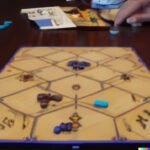The Game of Thrones board game is not for the faint of heart. With its immense popularity and complexity, it requires strategic thinking, careful planning, and cunning diplomacy to emerge victorious. In this article, we will delve into the intricacies of Game of Thrones board game strategies, providing you with a comprehensive guide to conquering the Seven Kingdoms.
First and foremost, let’s set the context. The Game of Thrones board game is based on George R.R. Martin’s epic fantasy series and features intense political maneuvering and warfare as different Houses vie for control of Westeros. Understanding the key concepts and dynamics of the game is crucial for success. From resource management to tactical troop deployments, every move you make must be calculated and strategic.
Strategy plays a pivotal role in achieving victory in the Game of Thrones board game. As you navigate the treacherous terrain of Westeros, your choice of House can greatly influence your playstyle. Each House comes with distinct characteristics and strengths that can be leveraged to gain an advantage over your opponents. Matching your playstyle with your chosen House’s attributes is essential for developing an effective strategy.
In the following sections, we will explore various aspects of strategy in the game. We will discuss how to master the map, strategically capturing territories and controlling vital areas for resources. We will also delve into the importance of negotiation and diplomacy in forging alliances or betraying rivals to gain power and influence.
Join us as we unravel these intricacies and uncover effective strategies that will help unleash your inner strategist in the thrilling world of the Game of Thrones board game. Whether you are a seasoned player looking to refine your skills or a newcomer seeking guidance, this article will provide you with invaluable insights that can tip the scales towards triumph on your quest for dominion over Westeros.
Understanding the Houses
In the Game of Thrones board game, one of the crucial decisions that players need to make is choosing a House to align with. Each House in the game has distinct characteristics and strengths that can greatly influence your playstyle and strategies. Understanding these attributes and finding a House that matches your preferred style of play can significantly enhance your chances of victory.
Analysis of the distinct characteristics and strengths of each House:
- House Stark: Known for their resilience, honor, and defensive capabilities, House Stark excels in holding territories and fending off attacks. Their unique ability to muster more troops during combat allows them to withstand enemy assaults and maintain control over crucial regions.
- House Lannister: Renowned for their wealth, political cunning, and manipulation, House Lannister thrives through diplomacy and strategic alliances. Their control over key resources like power tokens enables them to forge beneficial partnerships while exerting dominance over rival players.
- House Baratheon: Valuing strong naval power and expansionism, House Baratheon aims to conquer as many territories as possible. Their unique ability to consolidate power from different regions helps them bolster their military strength rapidly.
- House Tyrell: Focusing on growth, stability, and high population densities, House Tyrell excels at acquiring power tokens efficiently. Their stronghold position allows them to accumulate resources quickly while maintaining flexible diplomatic relationships.
- House Greyjoy: Embracing naval superiority, raiding tactics, and unpredictability in warfare, House Greyjoy excels at disrupting enemy plans. Their unique iron fleet advantage provides mobility across seas while sacking adjacent territories.
Matching playstyle with the Houses’ attributes:
When choosing a House that fits your playstyle, consider how you prefer to approach strategy games. If you enjoy playing defensively or strategically holding positions while warding off threats, then aligning with House Stark might be ideal for you. On the other hand, if you relish diplomatic negotiations and forming alliances to gain the upper hand, House Lannister’s manipulative nature might be a good fit.
Leveraging unique abilities for an advantage:
No matter which House you choose, it is essential to recognize and make use of their unique abilities. For example, House Tyrell’s ability to acquire power tokens efficiently can be exploited by actively engaging in combat while generating resources.
Similarly, House Baratheon’s consolidation of power serves as a way to bolster military strength rapidly and seize control over more territories. By understanding and effectively utilizing these attributes, players can optimize their chances of achieving victory in the Game of Thrones board game.
Mastering the Map
Navigating the sprawling map of Westeros is a crucial aspect of achieving victory in the Game of Thrones board game. Proper positioning and movement are key elements in securing dominance over territories and gaining strategic advantages. In this section, we will delve deeper into the intricacies of mastering the map and provide strategies for effective navigation.
The Importance of Positioning
One of the first things to consider when playing the Game of Thrones board game is the importance of proper positioning. Strategic placement of your forces can give you an edge over your opponents and allow you to control key areas on the map.
A critical aspect of positioning is understanding which territories to prioritize capturing and maintaining control over. Some regions offer valuable resources or allow for easier expansion, while others may provide defensive advantages. It is essential to assess the strengths and weaknesses of each territory and make calculated decisions based on your House’s goals and strategy.
Strategically Capturing Territories
The process of capturing territories requires careful planning and execution. When launching an attack, it is crucial to assess your opponent’s defenses, troop strength, and potential alliances they may have formed. Weighing these factors will help determine whether to engage in combat or focus on other objectives.
Maintaining control over captured territories is equally important as securing them initially. Fortifying key positions with additional troops can deter enemy attacks, making it more difficult for other players to reclaim those territories.
Advantages of Key Territories
Certain areas on the map offer significant advantages that players should aim to control. For example, holding strongholds or castles grants access to valuable special actions that can turn the tide in your favor. These special actions may include marshalling additional troops, consolidating power tokens, or influencing political events.
Controlling ports allows for faster troop movement across water regions-a pivotal advantage when waging wars or forming alliances with players located across the map. Additionally, ports facilitate trade, enabling players to acquire important resources necessary for their House’s growth and influence.
Mastering the map is an essential component of achieving victory in the Game of Thrones board game. By understanding the significance of positioning, strategically capturing territories, and recognizing the advantages of key areas, players can navigate Westeros with confidence and work towards establishing dominion over the Seven Kingdoms. In the next section, we will explore the significance of negotiation and diplomacy in the game as players engage in a delicate dance of forging alliances and backstabbing rivals.
The Diplomatic Dance
Explanation of the significance of negotiation and diplomacy in the game:
One of the key elements of the Game of Thrones board game is its emphasis on negotiation and diplomacy. In this game, players have the ability to form alliances with other Houses, forge agreements, and negotiate various deals to gain an advantage over their rivals. Negotiation and diplomacy play a crucial role in determining the direction of the game, as these interactions can shape alliances, betrayals, and ultimately impact each player’s chances of victory.
Strategies for forming and maintaining alliances with other players:
Forming strong alliances is essential in the Game of Thrones board game. These alliances can provide players with additional strength, support, and protection against common enemies. One strategy for forging alliances is to identify players who are also looking for allies and share similar objectives.
It is important to approach potential allies with offers that align with their interests while ensuring that your own goals are met as well. Additionally, establishing trust through consistent communication can help maintain strong alliances throughout the game.
When and how to betray your allies to gain an edge in the game:
While alliances can be beneficial, there often comes a point in the Game of Thrones board game where betrayals become necessary for personal advancement or survival. Timing is crucial when considering betrayal as a strategy. It is important to assess the state of the game, evaluate your position relative to your ally’s position, and weigh potential risks and rewards before making a move.
However, it is also important to remember that betraying an ally may result in consequences such as retaliation or severed relationships with other players. Therefore, careful consideration should be given when deciding whether betrayal would truly lead to a significant advantage or if it would jeopardize your overall strategy.
| Strategy | Description |
|---|---|
| Build Trust | Consistently communicate and fulfill promises to establish trust with potential allies. |
| Align Interests | Present offers and negotiations that align with the interests of potential allies. |
| Assess the Game State | Evaluate the overall state of the game, your position, and potential risks and rewards before betraying an ally. |
Resource Management
In the Game of Thrones board game, resource management is a crucial aspect of achieving victory. Understanding how to effectively manage your resources can give your House a significant power advantage over your opponents. Let’s take a detailed look at the different resources in the game and strategies for maximizing their potential.
- Power Tokens: Power tokens are the most versatile resource in the game as they allow you to exert influence and take various actions. It is essential to carefully decide when and where to use your power tokens strategically. For example, using them to bid on the Influence Tracks can provide you with key advantages such as positioning yourself higher on the Iron Throne or gaining priority in resolving ties.
- Supply: Supply is an important resource that determines how many orders you can issue each turn. With limited supply, it becomes crucial to prioritize your actions and make the most efficient use of your available orders. One effective strategy is to focus on consolidating power in high-value territories while maintaining control over key supply routes.
- Mustering Troops: Mustering troops allows you to reinforce and bolster your military strength throughout the game. Carefully planning when to muster troops based on strategic objectives can be a critical factor in success. Assessing the battlefield situation and gauging your opponents’ moves will help determine when it is best to build up your forces and when it may be more efficient to hold back.
To acquire additional resources for an edge in the game, consider focusing on:
- Consolidating control over high-value regions that generate extra power tokens or supply.
- Expanding into areas rich in valuable resources like castles or strongholds, which provide power tokens or allow for increased order placement.
- Forging alliances with other Houses that have access to resources you lack, enabling trade or mutual support.
By prioritizing resource management and following these strategies, you will maximize your House’s potential for power accumulation and, ultimately, increase your chances of victory in the Game of Thrones board game. Keep in mind that adaptability and flexibility are key as the game unfolds, so don’t be afraid to adjust your resource management strategies based on changing circumstances.
Deploying Troops
Once you have chosen your House and mastered the map of Westeros, it’s time to deploy your troops and engage in calculated warfare to secure victory. In this section, we will delve into the various troop types and tactics available, provide proven strategies for planning and executing successful military campaigns, as well as offer tips for defending strategic positions against enemy assaults.
The Game of Thrones board game features three different types of troops: Footmen, Knights, and Siege Engines. Each type has its own strengths and weaknesses that must be considered when deploying them on the battlefield.
- Footmen are the backbone of any army, providing balance between offense and defense. They are highly versatile and can be effective in a variety of situations.
- Knights possess superior combat abilities and should be used to spearhead assaults or defend crucial positions. They excel in one-on-one combat and can turn the tide of battle in your favor.
- Siege Engines are essential for capturing Strongholds or Castles, as they ignore enemy defenses during battles. They play a pivotal role in breaking through enemy lines and securing victory.
When planning your military campaigns, it is crucial to take into account the size and composition of your opponent’s forces. Use reconnaissance cards to gather intelligence on their troop distribution before making any moves. This information will help you determine where a decisive attack or defense should take place.
During battles, consider using tactics cards strategically to gain an advantage over your enemies. These cards can enhance your troops’ capabilities or disrupt your opponent’s plans. Timing is key when playing these cards – use them when they will have the greatest impact on the outcome of the battle.
Defending strategic positions is equally important as launching offensive campaigns. Hold onto strongholds or castles by stationing appropriate troops there, especially knights who possess superior combat abilities. It may also be beneficial to leave a small force as a deterrent against enemy attacks.
Dealing with Uncertainty
In the Game of Thrones board game, players must navigate not only the strategies and actions of their opponents but also the unpredictable influence of Wildlings and game events. These elements introduce a level of uncertainty that can greatly impact the course of the game and force players to adapt their plans on the fly. This section will delve into how to effectively deal with this uncertainty, offering strategies for navigating Wildlings and game events to your advantage.
The Wildlings represent a constant threat in the Game of Thrones board game. As they gather strength beyond The Wall, they periodically launch assaults on Westeros, disrupting gameplay and potentially punishing unprepared players. To successfully navigate the influence of Wildlings, it is crucial to stay informed and plan ahead.
Regularly paying attention to their advancing strength marker will give you an idea of when their attacks are imminent. Collaborating with other players to collectively contribute power tokens towards defending against the Wildling threat can be a wise move, as this not only strengthens your defenses but also builds trust amongst potential allies.
Game events add another layer of uncertainty to the game, introducing unexpected changes that can either benefit or hinder players. Some events may grant additional resources or allow for advantageous actions, while others may limit movement or hamper player progression.
To mitigate the impact of negative game events, it is important to diversify your strategic options rather than relying too heavily on a single approach. This way, you can adapt your plans when unfavorable events occur without compromising your overall strategy.
Navigating both Wildlings and game events requires a delicate balance between adapting to changing circumstances and staying true to your long-term goals. It is essential to evaluate each situation carefully and assess whether conserving resources for future turns or taking immediate action is more beneficial in light of these uncertainties.
Remember that unexpected events can present unique opportunities as well as challenges; being flexible in your approach can allow you to seize these opportunities and turn them to your advantage.
In summary, dealing with uncertainty in the Game of Thrones board game is a crucial skill for success. By staying informed about the Wildling threat, collaborating with other players, diversifying your strategy, and maintaining adaptability, you can navigate the influence of Wildlings and game events effectively. The ability to embrace and respond to uncertain circumstances will set you apart as a formidable strategist in the ever-evolving world of the Game of Thrones board game.
| Wildlings | Game Events |
|---|---|
| The Wildlings periodically launch assaults on Westeros | Game events introduce unexpected changes that can benefit or hinder players |
| Regularly pay attention to their advancing strength marker | Diversify strategic options to adapt plans when unfavorable events occur |
| Collaborate with other players to defend against Wildling attacks | Evaluate each situation carefully and assess whether immediate action or resource conservation is more beneficial |
Conclusion
In conclusion, the Game of Thrones board game is a complex and immersive experience that requires careful strategy and planning to achieve victory. Throughout this article, we have explored various key concepts and dynamics of the game, from understanding the distinct characteristics of each House to mastering the map and navigating Westeros for dominion.
Choosing the best fit for your playstyle is crucial in determining your chances of success. By leveraging your House’s unique abilities and strengths, you can gain a significant advantage over your opponents. Additionally, proper positioning, capturing key territories, and managing resources effectively are all essential for maximizing your House’s power.
Negotiation and diplomacy play a vital role in forging alliances and backstabbing rivals. Knowing when to form alliances, how to maintain them, and when to betray your allies can give you an edge in the game. Furthermore, deploying troops strategically and executing successful military campaigns are crucial for securing victory.
It is important to remember that uncertainty is inevitable in the Game of Thrones board game. Wildlings and game events introduce random elements that can disrupt even the best-laid strategies. Adapting to unexpected changes while staying true to your long-term plan will be key in overcoming these obstacles.
Frequently Asked Questions
What is the strategy of Baratheon in Game of Thrones board game?
The strategy of Baratheon in the Game of Thrones board game revolves around consolidating power and maintaining a strong defense. Baratheon starts out with a powerful navy, which allows them to project their influence across the seas. Their strategic objective is often focused on capturing strongholds and castles, expanding their territory to gain more resources and increasing their chances of victory.
However, due to their relatively isolated starting position in the south, Baratheon must carefully navigate alliances and diplomacy with neighboring houses while also defending against potential attacks from multiple directions. Ultimately, Baratheon’s strategy is centered on securing a foothold in Westeros and playing a balanced game between offense and defense.
Is Game of Thrones board game hard to learn?
The Game of Thrones board game can be challenging to learn initially, but it becomes easier with practice. Being an intricate strategy game with various mechanics for negotiation, combat, and resource management, players may find themselves overwhelmed by the initial complexity. Understanding the rulebook and grasping how different elements interconnect requires patience and concentration.
Additionally, for those unfamiliar with other board games in the same genre or without experience in strategic gameplay, it may take some time to fully comprehend all the nuances and strategies involved in maximizing one’s chances of success. However, once players grasp the core concepts and become familiar with the gameplay flow through several playthroughs, learning becomes much smoother.
What is the most popular strategy board game?
While opinions on popularity can vary depending on personal preferences and regions, one of the most popular strategy board games globally is Settlers of Catan (now known as Catan). This game has gained immense popularity due to its balanced mix of luck and strategy combined with accessible rules that make it easy for beginners to grasp while remaining engaging for experienced players. Settlers of Catan allows players to build settlements, roads, trade resources, and develop their own strategies for expansion while competing against others for victory points.
The game’s dynamic nature ensures that each session is different, contributing to its enduring popularity and widespread appeal. Despite the presence of many other acclaimed strategy board games, Settlers of Catan consistently ranks among the top choices for both casual and experienced board game enthusiasts.

I love playing all kinds of games – from classics like Monopoly to modern favourites like Ticket to Ride.
I created this blog as a way to share my love of board games with others, and provide information on the latest releases and news in the industry.





